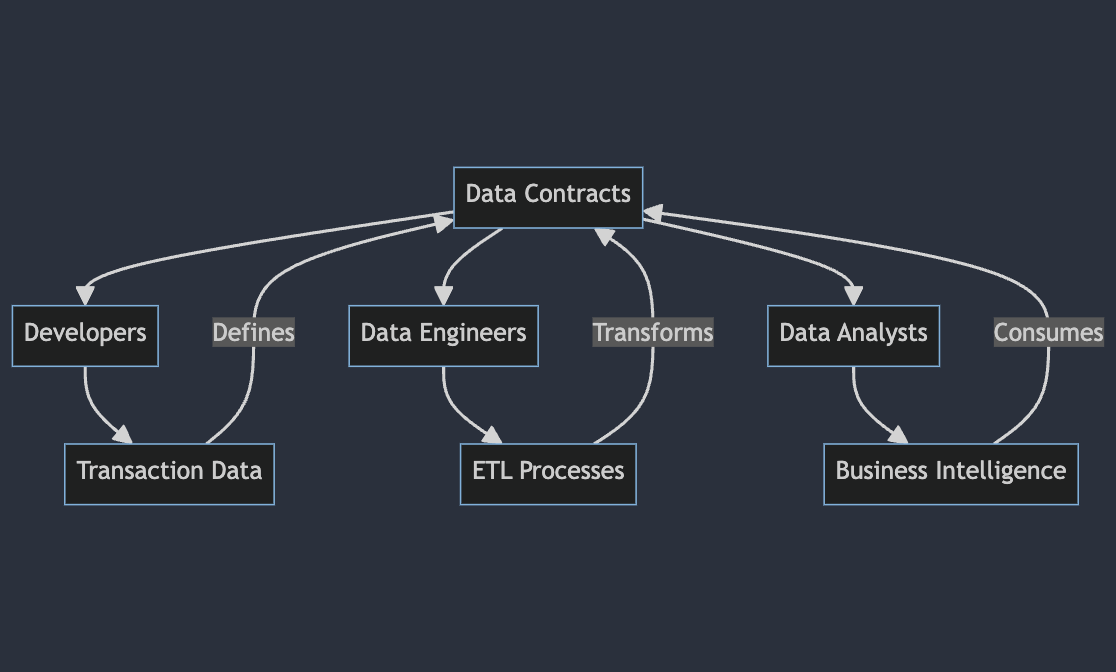Understanding Data Contracts: A Comprehensive Guide
Understanding Data Contracts: A Comprehensive Guide
Data contracts are formal agreements defining how data is exchanged between producers and consumers, ensuring consistency, reliability, and clarity in data usage. They are crucial for maintaining data integrity, enhancing collaboration, and reducing errors in modern data architectures.
What is a Data Contract?
A data contract specifies the structure, format, and rules of data exchange. It serves as a rulebook, ensuring that data remains consistent and predictable across different systems. This formal agreement includes details such as data schemas, semantics, service level agreements (SLAs), and metadata governance.
Why Are Data Contracts Important?
- Consistency: Ensures uniform data structure across systems.
- Data Quality: Maintains high data quality for accurate analysis.
- Interoperability: Facilitates effective communication between systems.
- Error Reduction: Minimizes data exchange errors, leading to smoother operations.
Key Components of a Data Contract
- Schema: Defines data attributes, types, and constraints, ensuring data validity.
- Semantics: Captures business rules and logical data relationships.
- SLAs: Specifies data availability, freshness, and recovery metrics.
- Metadata Governance: Includes data access controls, privacy regulations, and compliance guidelines.
Implementing Data Contracts
- Define Data Requirements: Agreement on data structure and formats.
- Automated Validation: Checks data against the contract before exchange.
- Version Control: Manages changes to the data contract.
- Documentation: Maintains clear records of the data contract.
Tools for Creating Data Contracts
Various tools help in authoring and validating data contracts, though many are still in early stages. Examples include:
- Schemata: A framework focusing on contract modeling.
- Soda.io: Used for creating and enforcing data quality contracts.
Best Practices
- Collaborative Approach: Involve all stakeholders in creating data contracts.
- Clear Language: Use simple and concise language to avoid misunderstandings.
- Regular Updates: Periodically review and update data contracts to align with evolving business needs.
- Versioning: Implement version control to manage contract changes without disrupting existing integrations.

Case 1: Developers and Data Engineers
Scenario* Application Developers: Produce transaction data in an e-commerce application. Data Engineers: Consume this data for ETL (Extract, Transform, Load) processes and store it in a data warehouse. Data Contract: The application developers define a data contract specifying the schema, data types, and quality checks for the transaction data.
dataContractSpecification: "0.9.3"
id: "transaction-data-contract"
info:
title: "Transaction Data Contract"
version: "1.0.0"
status: "active"
description: "Contract for transaction data from e-commerce application"
owner: "App Dev Team"
contact:
name: "John Doe"
email: "johndoe@example.com"
servers:
production:
type: "bigquery"
project: "ecommerce-project"
dataset: "production_transactions"
terms:
usage: "Data for ETL processes in the data warehouse."
limitations: "Data cannot be used for any other purposes without consent."
models:
transactions:
description: "Details of transactions made on the e-commerce platform."
type: "table"
fields:
transaction_id:
type: "string"
description: "Unique identifier for the transaction."
required: true
primary: true
user_id:
type: "string"
description: "Identifier for the user making the transaction."
required: true
amount:
type: "decimal"
description: "Amount of the transaction."
required: true
precision: 10
scale: 2
transaction_date:
type: "timestamp"
description: "Timestamp of the transaction."
required: true
quality:
type: "SodaCL"
specification: |
checks for transactions:
- row_count > 0
- schema:
fields:
- name: transaction_id
type: string
required: true
- name: user_id
type: string
required: true
- name: amount
type: decimal
required: true
precision: 10
scale: 2
- name: transaction_date
type: timestamp
required: true
examples:
- type: "csv"
description: "Example transaction data"
model: "transactions"
data: |
transaction_id,user_id,amount,transaction_date
"trx001","user123",100.00,"2023-01-01T00:00:00Z"
"trx002","user456",150.50,"2023-01-02T12:34:56Z"
Case 2: Data Engineers and Data Analysts
Scenario: Data Engineers: Produce cleaned and transformed data in the data warehouse. Data Analysts: Consume this data for business intelligence and reporting. Data Contract: The data engineers define a data contract specifying the schema, data types, and quality checks for the cleaned and transformed data.
dataContractSpecification: "0.9.3"
id: "cleaned-transaction-data-contract"
info:
title: "Cleaned Transaction Data Contract"
version: "1.0.0"
status: "active"
description: "Contract for cleaned and transformed transaction data"
owner: "Data Engineering Team"
contact:
name: "Jane Smith"
email: "janesmith@example.com"
servers:
production:
type: "bigquery"
project: "ecommerce-project"
dataset: "cleaned_transactions"
terms:
usage: "Data for business intelligence and reporting."
limitations: "Data cannot be shared outside the organization without consent."
models:
cleaned_transactions:
description: "Cleaned and transformed transaction data."
type: "table"
fields:
transaction_id:
type: "string"
description: "Unique identifier for the transaction."
required: true
primary: true
user_id:
type: "string"
description: "Identifier for the user making the transaction."
required: true
amount:
type: "decimal"
description: "Amount of the transaction."
required: true
precision: 10
scale: 2
transaction_date:
type: "timestamp"
description: "Timestamp of the transaction."
required: true
clean_date:
type: "date"
description: "Date when the data was cleaned."
required: true
quality:
type: "SodaCL"
specification: |
checks for cleaned_transactions:
- row_count > 0
- schema:
fields:
- name: transaction_id
type: string
required: true
- name: user_id
type: string
required: true
- name: amount
type: decimal
required: true
precision: 10
scale: 2
- name: transaction_date
type: timestamp
required: true
- name: clean_date
type: date
required: true
examples:
- type: "csv"
description: "Example cleaned transaction data"
model: "cleaned_transactions"
data: |
transaction_id,user_id,amount,transaction_date,clean_date
"trx001","user123",100.00,"2023-01-01T00:00:00Z","2023-01-02"
"trx002","user456",150.50,"2023-01-02T12:34:56Z","2023-01-03"
Conclusion
Data contracts are essential for modern data management, ensuring consistency, enhancing data quality, and facilitating better collaboration between systems and teams. By implementing clear and well-documented data contracts, businesses can significantly improve their data operations and drive more accurate insights from their data.
For more information on data contracts, visit these resources:
- Data Contract
- Atlan: Data Contracts 101
- Monte Carlo: Data Contracts Explained
- Data Mesh Manager: What is a Data Contract
- Medium: Data Contract 101
- DataHub Project: The What, Why, and How of Data Contracts
- Data Contract Code
Did you like the post? Empower me to dedicate more time and resources to curate, create, and share content that educates and inspires.

